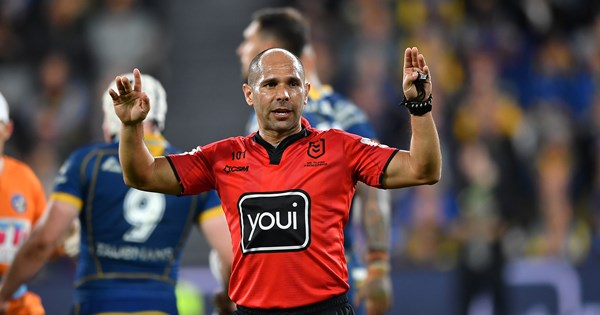BroncsFan
International Captain
Contributor
- Jul 28, 2016
- 23,018
- 34,138
NRL has announced their changes to rule interpretations

 www.nrl.com
www.nrl.com
A Challenge can be made following the final play in each half provided the referee has not already called half or full-time. The changes will add further clarity for fans, broadcasters, Clubs and players around when a Captain’s Challenge can and cannot be initiated.
“While relatively minor, these changes will improve three elements of the game – player safety, the game presentation for fans and off-side compliance,” NRL Executive General Manager – Elite Football Graham Annesley said.
“We undertook a thorough review of the 2022 season, including consultation with the NRL Clubs, the RLPA and other stakeholders.
“The overriding feedback was the current interpretations are creating a faster and more free-flowing game, but there was a need to address some minor issues which have emerged.
“These changes will allow Clubs and players clarity on certain issues while also giving fans more entertainment and transparency as the game evolves in 2023.”

No new rules for 2023 season
The Commission, after extensive consultation with all stakeholders, has decided not to introduce any new Rules for the 2023 season.
AMENDMENTS FOR THE 2023 SEASON
Grounding the Ball
Tries will now be awarded if the ball rotates from the hand to the wrist or forearm provided there is no obvious separation between the ball and the hand or arm. The new interpretation will allow further clarity for officials when adjudicating grounding.Operation of the 18th player rule
The number of failed head injury assessments will be reduced from three (3) to two (2) to trigger the activation of the 18th player. This will allow greater flexibility for Clubs which lose multiple players to head injuries in a match.Intervention of Bunker in Foul Play
The Bunker may only intervene for acts of foul play which it deems to be reportable. The change will ensure fewer needless stoppages while also confirming a firmer process around foul play intervention.Captain’s Challenge
A challenge may be initiated after the referee blows his whistle to stop play, rather than only after a decision resulting in a structured restart. Decisions which cannot be challenged will continue to include forward passes, roll balls and discretionary penalties including 10m offside, ruck infringements relating to play-the-ball speed, tackled into touch after held call and dissent.A Challenge can be made following the final play in each half provided the referee has not already called half or full-time. The changes will add further clarity for fans, broadcasters, Clubs and players around when a Captain’s Challenge can and cannot be initiated.
Off-side infringements at scrums
A full penalty will be awarded (rather than a set restart), for off-side scrum infringements by the defensive team anywhere on the field. The non-infringing team will retain the option of repacking the scrum or taking the awarded penalty. Any team which deliberately locks the ball in the scrum to trap defenders in an off-side position will also be penalised.10m compliance in general play
Active defenders must have both feet in line or behind the referee when setting the 10-metre defensive line. Referees will have the option of awarding a full penalty for multiple 10m breaches without requiring the mandatory use of the sin bin. Referees can still use the sin bin if they consider breaches to be deliberate or cynical. The changes will give further clarity to officials and teams around what constitutes a breach of the rules.Adjudication of completed tackles
Referees will issue a single call of “held/release” when a tackle is complete, rather than the separate calls of “held” and “release”. The change will address unnecessary slowing of the play-the-ball and improve game continuity.“While relatively minor, these changes will improve three elements of the game – player safety, the game presentation for fans and off-side compliance,” NRL Executive General Manager – Elite Football Graham Annesley said.
“We undertook a thorough review of the 2022 season, including consultation with the NRL Clubs, the RLPA and other stakeholders.
“The overriding feedback was the current interpretations are creating a faster and more free-flowing game, but there was a need to address some minor issues which have emerged.
“These changes will allow Clubs and players clarity on certain issues while also giving fans more entertainment and transparency as the game evolves in 2023.”






